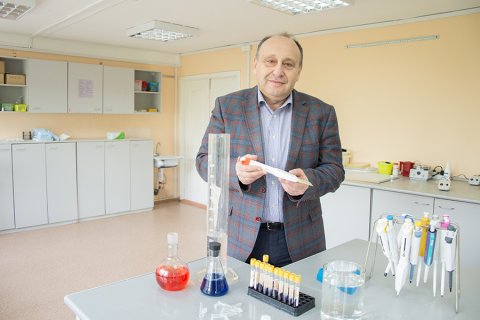The study of chronic stress is the main goal of the International Laboratory of Neurohepatology at South Ural State University. Scientists pay great attention to post-traumatic stress disorder, as one of the consequences of stress. Recently, foreign researchers named a new type of PTSD complex PTSD, and SUSU scientists first introduced its experimental model. An article on the experimental confirmation of the diagnosis of "complex post-traumatic stress disorder" caused by chronic stress is published in one of the most highly-ranked journals of the first quartile Psychoneuroendocrinology.
The center for major medical and psychological research at the South Ural State University is the International Laboratory of Neurohepatology. Since 2016, it has been studying chronic stress and the changes it causes in the body, including the post-traumatic stress disorder syndrome.
Post-traumatic stress disorder (PTSD) is a severe mental condition that occurs as a result of a single or repeated highly negative impacts on the individual's psyche, posing a threat to life. It can occur after receiving a serious injury, sexual abuse or its possible outcomes. PTSD is diagnosed by the presence of a number of symptoms, such as increased anxiety, nightmares, outbursts of anger (flashbacks), etc.
New PTSD subtype
Recently, complex PTSD has come into diagnosis. This disorder occurs with multiple, chronic, and repeated injuries that cannot be avoided. For example, child abuse can cause complex PTSD in children, and violence, torture, military detention causes it in adults. Previously, it was believed that PTSD was associated only with a serious psychological trauma.
Since complex PTSD as a subtype of stress disorder was described not so long ago, there were no experimental models of it before. This gap was filled by scientists at SUSU. As explained by the director of the School of Medical Biology, PhD, Professor Vadim Tseilikman, such models are necessary to study the development of the disease, to describe its clinical symptoms. An experimental model created by researchers at SUSU appeared after the experiments of scientists from Ben-Gurion University in Be'er Sheva (Israel).
“In our model, the rat inhales cat odors. Israeli colleagues showed that one session is enough to watch anxiety-depressive disorders after a while. We increased the number of episodes of such sessions. It turned out that in addition to behavioral disorders, we reproduced some features that were absent in the Israeli model. In the clinic of patients with PTSD, a decrease in the hormone of the adrenal cortex, cortisol, is noted. This hormone allows one to withstand stressful effects. But in all experimental models, the level of glucocorticoids, analogues of cortisol, was not reduced, but sharply increased. And in our model, we achieved a decrease in corticosterone. It turned out that our model is characterized by adrenal insufficiency, and some PTSD patients also develop adrenal insufficiency over time. Also in this model, it was possible to reproduce such disorders of the cardiovascular system as reduced blood pressure, and impaired cerebral blood flow. Other models do not reproduce this,” professor Zeylikman says.
.jpg)
Stress tests
Based on this model, SUSU scientists conducted a series of experiments using interval hypoxic training. They treat the dysfunction of the internal organs and brain. Research has been possible because the development of models was carried out before the changes in the classification of diseases. Due to the uniqueness of the proposed model, as well as its priority tasks, scientists from SUSU and their colleagues who participated in the work at the highest level, there is every chance to take a leading position in the field of studying PTSD.
“One of my students, Denis Kozochkin, the first director of the School of Economics and Management, created this model in 2013. To do this, he needed to find a PTSD model for further research. At first it seemed to us that we modified the Israeli model. They decided that if they switch to chronic stress, they only strengthen the signs and increase the efficiency of the existing model. But we observed different symptoms in our model. As a result, the models were so different that we realized: ours is separate, caused by chronic stress. When a new diagnosis appeared, everything fell into place. We were lucky to get ahead of our colleagues. Now to complete the validation of models and conduct all the necessary experiments is our first priority. We will be able to take a leading position in the study of post-traumatic stress disorder,” Vadim Tseilikman continued.
In the future, this model will help in the treatment of complex PTSD, for example, it can be used for preclinical drugs development. Some drugs do not work properly for patients with post-traumatic stress disorder. It will be possible to find out the reason and improve the situation using the model.
In the future, SUSU researchers intend to find out to what extent liver damage in patients with PTSD interferes with medicine absorption. The scientists are going to study the effect of neurotransmitters and stress hormones on the state of enzymes responsible for drugs absorption and dosage.
South Ural State University is a university of digital transformations, where innovative research is being conducted on most priority areas for the development of science and technology. In accordance with the strategies of scientific and technological development of the Russian Federation, the university is focused on the development of large scientific interdisciplinary projects in the field of IT, materials science and ecology. In the framework of these areas, metallurgy, engineering, energy, utilities, safe space of urban infrastructure and human comfort are investigated and improved.
SUSU is a participant in the 5-100 project intended to increase the competitiveness of Russian universities among the world's leading research and educational centers.




